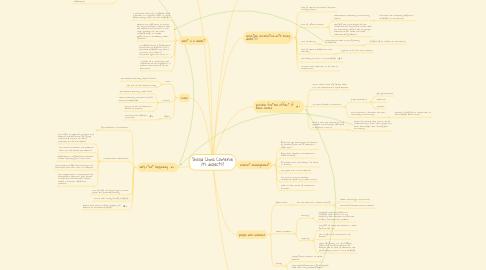
1. Guidelines
2. scale
2.1. local
2.1.1. the dialects diversity within Province
2.1.2. the lose of the dialects locally
2.2. national
2.2.1. the dialects diversity within China
2.2.2. cultural diversity and their strong history backgrounds.
2.2.3. the connection of dialects in different province
2.3. global
2.3.1. international effects: cantonese
3. what accelerate the problem
3.1. The convenience manderian brings
3.2. The stereotype to the people who speak dialects
3.2.1. anti-foreign
3.2.2. provincialism
3.3. the younger age people start losing ability due to speak dialects due to the prohibit of dialects in school.
3.4. Government
3.4.1. reduce stereotype and preiudice
3.4.2. provide better communication condition and overcome the communication difficulties.
4. why start happening
4.1. generalisation of manderian
4.1.1. unpractical language (the percentage of population that is still using dialects is low.)
4.1.2. benefits in education, commerce,politics
4.2. communication difficulties
4.2.1. the region is mixed of Mandarin and dialects and different age groups understand only one of them., especially the old and children.
4.2.2. the external workers and students does not understand the dialects.
4.2.3. difficulties in long distance domestic travel, especially go to rural area.
4.2.4. some province might have minority and therefore have more than one dialects.
4.2.5. the communication requirements for technologies, education, jobs, politics and general communication (social media) in between different provinces.
4.3. anti-foreign and stereotype to them people who speak differently
4.4. accent when study foreign language
4.5. Government doesn't offer majority of dialects as standard language
5. what is a dialect
5.1. a particular form of a language which is peculiar to a specific region or social group (always refer to local language)
5.2. dialects are different to accent An accent becomes a dialect when the differences between it and other speakers of the same language begin to include differences in vocabulary and/or grammar.
5.3. a language forms a geographical branch that is different to a standard language, only used in a certain area, such as Cantonese (yue), min, wu so on.
5.4. q symbol of a nationality, the represents of the cultures in a province, (the meaning of the hometown)
6. negative association with losing dialects?
6.1. lost of cultural connection between nearby province
6.2. lost of regional culture.
6.2.1. multicultural community and minority culture.
6.2.1.1. minorities use completely different languages to mainstream.
6.2.2. changing the pronunciation of the words and the meaning of words, which can essentially affect the way people understand the words and cause understanding problems.
6.3. lost of history
6.3.1. some dialects have a strong history background
6.3.1.1. forgetting to reflect on the history
6.4. lost of cultural difference and diversity
6.4.1. appears to be the same cultural
6.5. less ability to learn a new language
6.6. requires more education to be able to communicate.
7. people who involved
7.1. government
7.1.1. ban the dialects in school teaching
7.1.1.1. reduce stereotype and accents
7.1.1.2. overcoming communication problems
7.2. dialect speakers
7.2.1. minority
7.2.1.1. speaking completely different language which there is no any similarity with mandarin and has the largest communication problem.
7.2.2. majority
7.2.2.1. only 30% of people use dialects in their general life now.
7.2.2.2. the targets of conservation of dialects
7.2.2.3. elder age groups are the biggest suffer of the generalisation of dialects due to lack of education and losing ability to learn a new language..
7.3. family
7.3.1. stopping their children to speak dialects
7.3.2. stop speaking dialects in generally life which then stop providing dialect- communication condition
8. current management
8.1. Eliminate the stereotypes of dialects by promoting the use of dialects in public space
8.2. Apply both mandarin and dialects in school teaching
8.3. Introduce more local dialect TV shows or dramas
8.4. let people learn all the dialects
8.5. set laws to protect dialects (ie.dialects speak only in public areas)
8.6. take a radio record of all dialects branches
9. possible further effect if been solved
9.1. there will be some age groups which can not understand or speck dialects
9.2. to cause further inconvinence
9.2.1. people movement
9.2.1.1. job opportunitiies
9.2.1.2. education
9.2.1.3. tourism
9.2.2. less connection in between the Han nationality and minority.
9.2.2.1. isolation of different culture duo to the language disconnection..
9.3. doesn't stop the stereotype and prejudice to the people who speak in different accent
9.3.1. people who doesn't have accent will be respected more from other people and have advantages when finding jobs (inequality)
10. why does it considered a wicked problem
10.1. if still apply dialects, there will still be several problems (follow the green arrow)
10.2. if generalise mandarin
10.2.1. no cultural diversity and difference
10.2.2. accent within mandarin can still cause stereotype and prejudice.
10.3. 图说中国还有多少人会说方言—莫眼的博客—强国博客—人民网 (diagram)
11. positive association with losing dialects?
11.1. generalisation of mandarin
11.1.1. overcomes the communication problems
11.1.2. allows free flow of ideas, information, goods
11.1.3. allows cultural exchange

